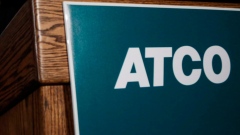Sep 22, 2023
Champagne says grocers agreed to 'meaningful action' on prices
, BNN Bloomberg
Now is the time to de-escalate tensions between Canada and India: Minister Champagne
Industry Minister François-Philippe Champagne says grocery executives agreed to take action to stabilize food prices when they met with federal officials on the issue this week, and their plans will be presented next month.
The meeting happened on Monday in Ottawa, where Champagne and Finance Minister Chrystia Freeland met with top executives at Loblaw, Metro, Empire, Walmart and Costco.
In a Friday interview with BNN Bloomberg, Champagne said the two-hour negotiations were “difficult at times,” but both sides eventually found common ground.
“At the end of the day, bottom line is that they agreed to take meaningful action to stabilize prices in Canada,” he said. “I expressed to them the frustration of millions of Canadians.”
According to Champagne, the federal government “fixed the goal,” but left it to the firms to decide how to get there.
“We'll wait for their plans, we'll review them and we'll have something to present before Thanksgiving, which is the deadline that's been given by the prime minister,” he said.
COMPETITION ACT AMENDMENTS
The federal government is also seeking amendments to the Competition Act that would give the Competition Bureau the power to take action when corporations work together to reduce consumer choice.
Michael Osborne, chair of the Canadian Competition Practice at Cozen O'Connor, said in a Thursday interview with BNN Bloomberg that recent efforts by the federal government to tweak competition law are “mostly useless” and unsuited to address inflationary pressures.
“It is not going to address the problems that we have with inflation. And the reason for that, fundamentally, is a competition law is not a tool that's designed to fight inflation,” Osborne said.
“Inflation is caused by macroeconomic factors, whereas competition law, it deals with things like price fixing, and competitive mergers and the like.”
Osborne said that unless we see that type of behaviour in the grocery industry, which he sees “no evidence of,” then competition law will not address the issue.
He said that while competition can lower prices, efforts by the federal government are targeting the grocery industry and “blaming them for inflation that’s been caused largely by other factors.”
“It can help, but it's not a tool for addressing the fundamental issues that are driving inflation in the current market,” Osborne said.
Former Liberal deputy prime minister John Manley criticized the recent efforts by the federal government to stabilize food prices by focusing on grocery stores.
Manley said in a Monday interview with BNN Bloomberg that if the government really wanted to “do something about food prices,” it would focus on supply management.
In response to criticism of the government’s recent efforts, Champagne suggested people “look at the outcome” and highlighted the agreement reached between the government and the nation’s largest grocery retailers.
He also argued that there is a need to reshape Canada’s competition law.
“As a lawyer, I'm looking at our competition law in Canada, and I've been seeing what's been done in the U.S. and in Europe, I'd say we have a framework which is in much need of reform,” Champagne said.
He pointed to a recent study from the Competition Bureau looking at the grocery sector, noting the government wants to give the commissioner subpoena power because the study “did not get some of the information needed.”
“We're going to fix that,” Champagne said.
In August the pace of grocery price inflation slowed but prices remained elevated. Food prices increased by 6.9 per cent in August compared to the previous year, down from an 8.5 per cent annual increase in July.






